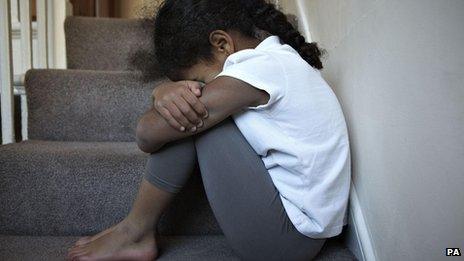Sex crimes against young children rise, research suggests
- Published

The NSPCC launched a new helpline last year
Recorded sex crimes against children under 11 in England and Wales went up by 16% last year, research suggests.
There were 5,547 incidents, against the previous year's 4,772, according to data from 41 police forces obtained by children's charity, the NSPCC.
This means that 24% of all recorded sexual offences against children involved the youngest age group, with some victims as young as one.
The NSPCC said nearly half (46%) of parents had not tackled the issue.
The charity said the number of recorded crimes could have increased because more people were now coming forward in the wake of the Jimmy Savile scandal.
The NSPCC launched a campaign last summer to encourage parents to discuss sex abuse with their children.
Chief executive Peter Wanless said: "Sexual abuse continues to be a terrible scar on our society which won't heal by itself.
"Our campaign has started to make inroads in giving children the protection they need but there is obviously still a long way to go.
"The police figures are worrying because they should be going down not rising, although the 'Savile effect' may be resulting in more people reporting abuse.
"Whatever the reason, this highlights the urgent need to tackle this problem from an early age and parents and carers can play an important role by ensuring their children are armed with the knowledge to recognise the wrong kind of behaviour and keep themselves safe."
Five principles
The NSPCC wants parents to teach children five basic principles: "Privates are private, always remember your body belongs to you, no means no, talk about secrets that upset you, speak up - someone can help."
The overall figures for under-age sex abuse remained stable last year compared to the previous one.
A total of 22,654 sexual offences against under-18s were reported to police with nearly four out of five cases (17,354) involving girls.
Most of the offences, including rape, sexual assault, abuse through pornography and grooming, were against children of secondary school age.
- Published23 December 2013
- Published20 December 2013